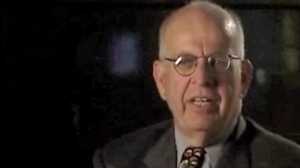Historian Margaret Washington
Historian Margaret Washington discusses antebellum women's rights, partisanship and the press, and wage slavery for the film Abraham and Mary Lincoln: A House Divided.
Transcript
On Antebellum Women's Rights
Middle class women in antebellum America were basically confined to the home. Women were expected to assert themselves and exert influence within the home. They were supposed to have influence on their husbands, their brothers and their fathers. And in this way impact politics, culture, religion. But they were not to speak openly in public. They basically were supposed to follow the dictates of St. Paul, let women keep silent. And this was not only in the churches, but this extended into the community and women accepted that role.
The abolitionists movement changed all that because the male abolitionists encouraged women to participate, not as equals, but to participate by creating resources, having sewing circles, bazaars, raising money so that the men could go out and lecture and create newspapers. And women accepted this for a while and then gradually they began to speak out. Women formed their own antislavery societies and within these societies they voiced their opinion about abolition.
Two women, two white women, Angelina and Sara Grimké, really opened up the convergence of women's rights and abolition. And one black woman, Maria Stewart did the same thing, actually a little bit earlier. But it was really the Grimkés who spread the idea of women's equality and that it was morally right for women to speak out against slavery just as it was morally right for men to speak out against slavery. So it really is to the Grimkée sisters, in terms of publicizing the connection between women's rights and abolition, that we owe that connection. However, it was the Antislavery Convention in 1839 that really mushroomed the connection between abolition and women's rights for most activist women because at that convention women were allowed to vote and they voted in one delegate to go to the World Antislavery Convention in London. When the women got there and the delegate who was Lucretia Mott appeared with her credentials from the American Antislavery Society she was not seated. And she was not seated because she was a woman. And that crystallized for women their own position, that they were fighting for the rights of African Americans when in many situations they, themselves were oppressed. So one could say that had not been for the abolition movement that women would not have found their voice at the time in which they did.
On Partisanship and the Press
Newspapers were extremely important in antebellum America. They were a form of mobilizing citizens and particularly the middle and upper classes. They were a form of spectacle. They were the major means of communication. They were also the ways in which Americans discovered what was happening politically. It was important for Americans to form political alignment. And newspapers essentially set the tone for that. And, although we tend to think of newspapers in this period as regional in terms of their opinions, often times newspapers in northern cities represented various opinions. Not necessarily the kinds of opinions one would think were reflective of northern attitudes. So that you would have a newspaper like the New York Tribune whose editor, Horace Greeley, leaned toward antislavery, being able to discuss the antislavery movement, the women's rights movement, interviewing individuals on the progressive side of American society in the North.
And then you would have editors of newspapers such as the New York Herald who would do just the opposite. They would focus on the more conservative aspects of American politics. They would interview the more conservative American politicians. They would often times give in to caricatures of African Americans and other non-northern Europeans. That would include people who were Catholic and Irish.
So Americans in their newspapers often had their public opinions formed. In addition to the northern newspapers, of course, the southern newspapers did the same thing. Now it is important to understand that the South was a close society. And newspapers did not take a progressive position on reform issues. The Charleston Mercury for instance, even if there were someone on the staff who was reform minded or sympathetic to any issue of a progressive nature would never publish any such thing.
So, at the same time that the Charleston Mercury wouldn't publish anything progressive that was related to the reform issues of the day, the northern newspapers would publish what the Charleston Mercuryprinted. So that there was this network of communication across regions in which the newspapers that were sympathetic to the particular political proclivity of a southern newspaper would publish that in the northern newspaper and publish it as it was printed. That is the way the Herald would respond to what was printed in the Charleston Mercury. On the other hand, someone like Greeley might publish something in the Charleston Mercury, some caricature of African Americans or some antislavery diatribe or pro-slavery diatribe against the antislavery presses. But the Tribune would also qualify that, criticize that. So there was partisanship in the newspapers, is the point. Newspapers were not neutral. Newspapers were the political vehicle of a particular group and sometimes they were the cultural vehicle as well. It is also important to keep in mind that some of the newspaper editors were very friendly with not only political leaders, but with individuals who had a particular position on certain issues. Greeley was very close to the head of the American Antislavery Society, William Lloyd Garrison. The editor of the Charleston Mercury was very close to southern, South Carolina senators. So there was partisanship in the newspapers, that was how they operated.
On Wage Slavery
When northerners criticized southerners for owning enslaved people, southern intellectuals had an answer for them. They had developed an entire philosophy and the most significant component of this was a man named George Fitzhugh. And Fitzhugh's argument with something like this, an enslaved person was, from the time that they were born until the time that they died were taken care of. When they were young they didn't have to work, and yet they were fed. When they were older, although they labored, they had food provided for them, they had shelter, they had clothing. When they were ill they were taken care of. When they were old and decrepit they were taken care of. So the system, even though the system extracted labor from them, the system took care of them throughout their lives.
In the North, Fitzhugh argued, on the contrary. A northern worker was employed as a child, so they experienced child labor. They were not paid for their livelihood at a descent wage. They were also not paid for their rent. They were not given food. They had to take all of the money that they got from their labor and use that for livelihood which the slaves did not.
Now the argument that does not enter into Fitzhugh's discussion, of course, is that there was such a thing as mobility, not to mention the fact that one population is enslaved and cannot move and another population has the ability to leave that job to go to another job, to go west. So this idea of mobility, this idea of not being chattel, this idea of being able to move from one place to another does not enter into Fitzhugh's arguments. The whole idea of civil rights which northern workers had, by the antebellum era, all white males, the majority of white males could vote. So they had rights. Enslaved people had no rights, indeed the Dred Scott decision handed down by the Supreme Court decreed that not just enslaved, but black people had no rights. So it is an argument that was used, and it was an argument that many, many southerners accepted. But it was an argument that was certainly speechless.







